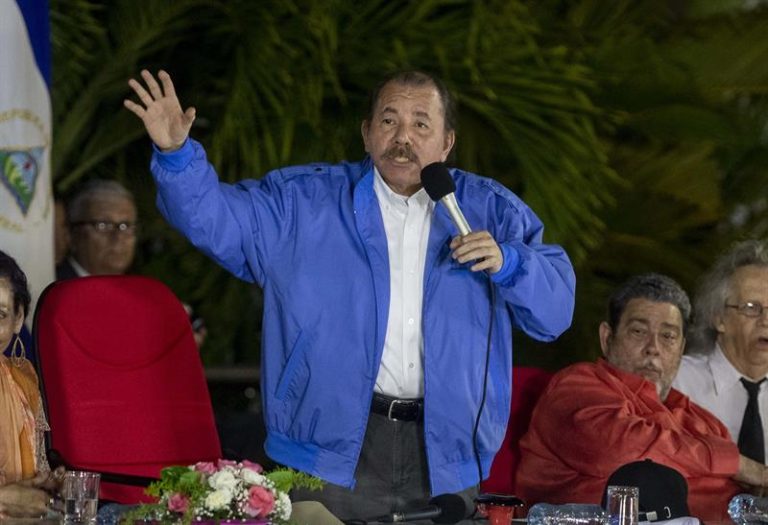3 de mayo 2019

Children of Exile: The Births “Sowing Hope” in the Camp of Nicaraguan Farmers

PUBLICIDAD 1M
PUBLICIDAD 4D
PUBLICIDAD 5D
Ortega calls “human misery” those who ask for international sanctions against his regime, accused of committing crimes against humanity.

Daniel Ortega talking about the international sanctions on his government. Photo: Confidencial
The pretension of the regime of Daniel Ortega to get the Civic Alliance for Justice and Democracy to sign an agreement with the government to call for the cessation of international sanctions against the dictatorship, was rejected on Tuesday, so the negotiations remain stalled. The government proposal, which was presented on Monday, was discussed yesterday without the parties being able to reach an agreement.
Faced with the failure of the negotiations, the dictator Ortega called “human misery” those who oppose him and promote international sanctions against the Sandinista elite. The last representative of the regime that was sanctioned by the Department of the Treasury of the United States was Laureano Ortega Murillo, one of the sons of the presidential couple.
“Those who are going around on their knees asking for sanctions against the people…that is the most wretched that can be on earth and the most vile thing that can be done here in our homeland Nicaragua, because in these matters there are people celebrating each time there is a sanction against Nicaragua,” said Ortega.
President Ortega, accused of having committed crimes against humanity, after causing more than 300 murders in Nicaragua, pointed out that those who ask for international sanctions against him: “have no soul, have no heart, they only have poison…it is the poison that makes them miserable. That is human misery. They are an expression of human misery,” he said.
He also warned that his delegates in the negotiation with the Civic Alliance will continue to try to stop the sanctions: “Faced with these realities we cannot renounce, as we have not renounced, to seek agreements, to talk and seek agreements with these human miseries.”
Negotiate but do not comply with agreements
The representative of the Civic Alliance, Mario Arana, recalled that the sanctions were adopted by the international community as a pressure mechanism for the regime to accept a negotiated solution to the sociopolitical crisis of the country. He explained that Ortega “is mistaken when he thinks that without commitment and a will of a clear fulfillment” of the signed agreements, “the countries that have imposed sanctions on him are going to modify their position.”
Arana calls “irrelevant to issue statements calling for the suspension of sanctions without any basis in facts and real commitments.” Additionally, he explained that in the agreements signed by the parties, on March 20, is the will of the Negotiating Table that “until the conditions are met: agreements, compliance and implementation,” it would be viable to request the suspension of sanctions.
On this point, Wilfredo Navarro, spokesman for the delegation of the regime, made it clear that the intention of the government is to negotiate the cessation of international sanctions in exchange for the freedom of political prisoners, whom he said “will leave (prison) but within the order established by the constitution and based on the state of their legal status.”
“They (the alliance) cry out for their first-class prisoners, but when we tell them to make a call for the dialogue to develop in peace and tranquility…they flatly refuse. They flatly refuse to accept or sign a statement demanding the suspension of sanctions to Nicaragua, because they are not sanctions against the Government of Daniel Ortega, they are sanctions that are affecting the people of Nicaragua,” Navarro said.
Implementation mechanism are defined
The members of the Civic Alliance are still trying to establish the mechanism for implementing the agreements signed on March 20, which establish the release of political prisoners.
At the end of the meeting, the economist and president of AmCham, Mario Arana, insisted that “our priority has been with the political prisoners, so that we have a timetable starting May, with the list of the people who are going to go out (of prison) and thus bring peace to their homes.”
Meanwhile, the proposal that was presented by the international witnesses of the national dialogue, the Vatican representative Waldemar Sommertag and the representative of the Organization of American States (OAS), Luis Angel Rosadilla, has remained on the table without being able to be realized.
In addition, the Civic Alliance reiterated through a statement that the proposals in which no consensus was reached with the regime included: “The progressive release of prisoners and detainees in the month of May. And that the whole release process be done with the participation of the International Committee of the Red Cross,” says the document.
“Invitation to international guarantors for the Agreement on civil liberties and legal freedom for Nicaraguans, both inside or outside the country, who face open court cases but have not been detained,” continues the Civic Alliance statement.
Next week an OAS delegation will arrive in Nicaragua to begin the discussion on electoral reforms.
Thank you for reading our English section, brought to you in collaboration with Havana Times. If you wish to subscribe to our English Weekly Newsletter, you can do it here. Please spread the word and share this link with your friends, family or contacts.
Regards,
Archivado como:
PUBLICIDAD 3M
Confidencial es un diario digital nicaragüense, de formato multimedia, fundado por Carlos F. Chamorro en junio de 1996.
PUBLICIDAD 3D